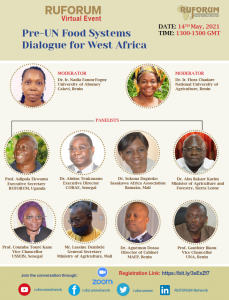Официальная обратная связь диалога для Саммита ООН по продовольственным системам 2021 года
Виды диалогов
Организатор
Язык диалога
Дата/время
Окончание
Город
Местоположение
Формат
Просьба ознакомиться с приводимыми ниже данными для получения регистрационной информации, если таковая имеется, или обратитесь к руководителю диалога, если желаете принять участие.
Описание
Positioning food systems to address the future challenges and opportunities will require a transformation in how Africa particularly thinks about future goals and interventions to improve the performance of its food systems. From the onset, there must be a transformation in the food system focus beyond producing sufficient quantity of food to achieving four interlinked outcomes: (i) remunerative jobs and better agribusinesses; (ii) affordability and accessibility for food security; (iii) nutritious, diverse, quality and safe food; and (iv) sustainable, resilient agriculture and food systems.
There are a growing number of research documents with evidence and fact-based research around ways to improve sustainable agricultural production, diets that will save the planet and approaches to food loss and waste amongst others. There is however, a need to scan for valuable research that has an economic/policy influence as a case for action amongst public and private decision makers, with potential to change behaviors and practices that will ultimately shape the planet´s food systems. We need to understand if the results from the diverse research topics are effectively reaching the food systems end users notably, policy makers, farmers and consumers. There is a need to explore alternative pathways to ensure that research outputs reach targeted beneficiaries and can influence sustainable food systems. This may imply developing strategic alliances between scientific institutions, universities and practitioners (farmers, indigenous groups, women, youth, chefs, etc) to foster transformation and prepare the next generation to have a more holistic and systemic perspective.
Regional level institutions have a strong foundation and role in championing regional level initiatives that provide an aggregative push for regional level systems change.


